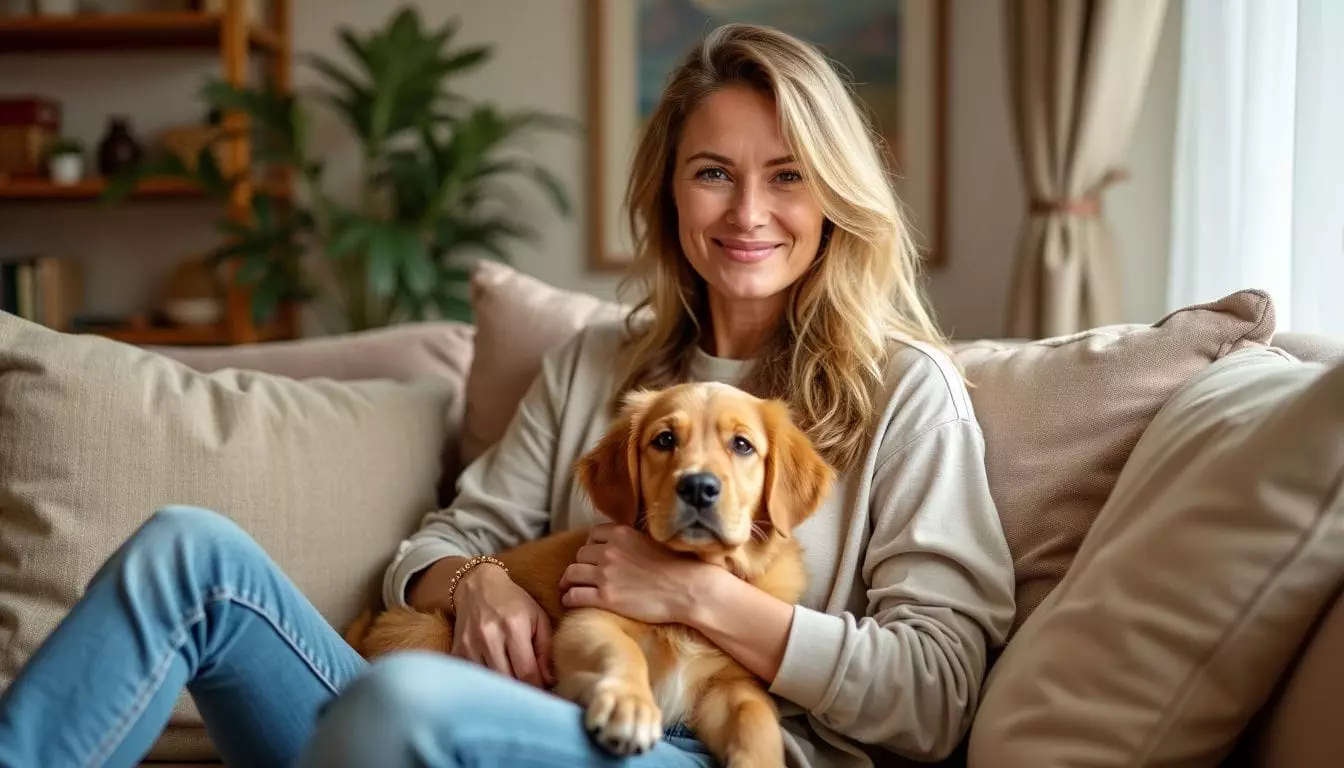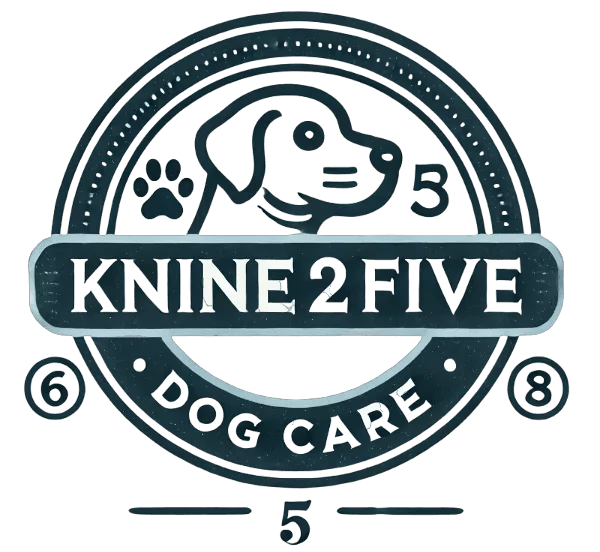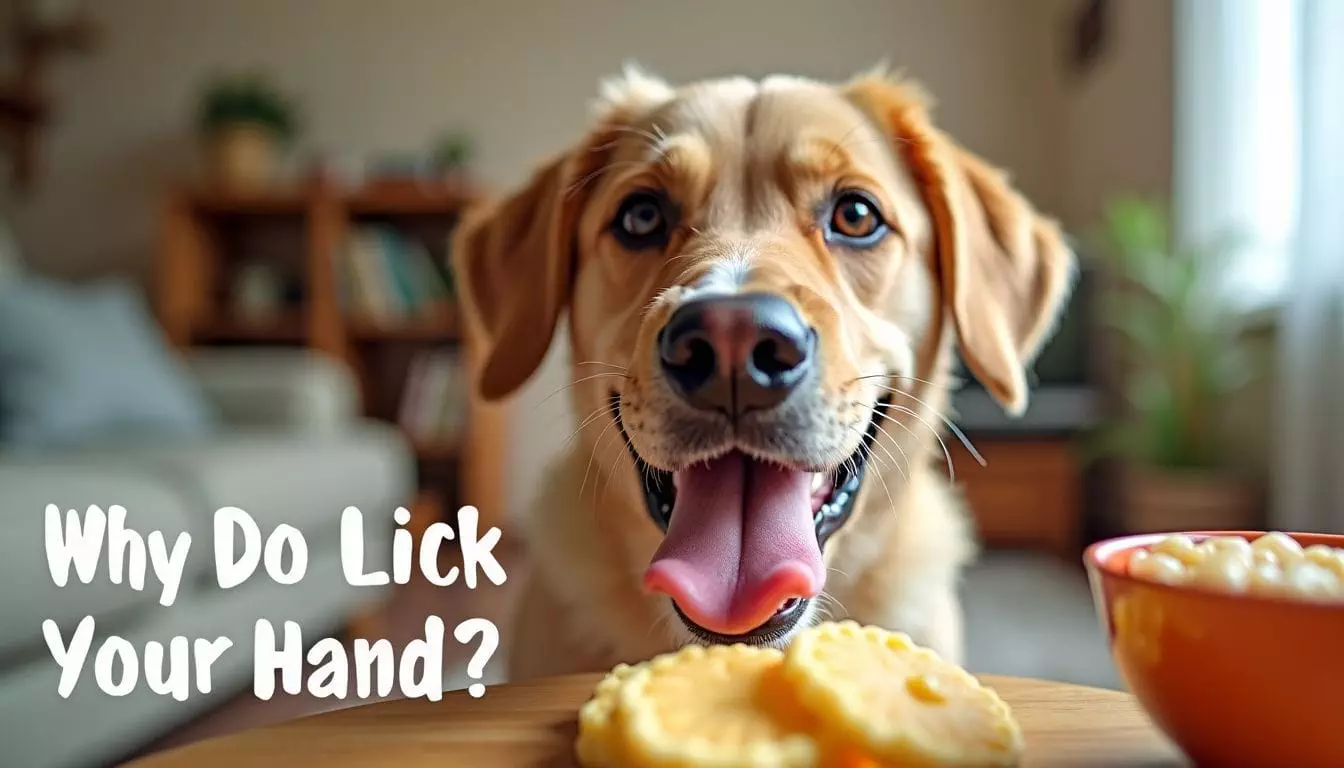Dogs lick hands for many reasons. Affection, taste, and compulsion top the list. But why do dogs lick your hand? This behavior stems from instincts and learned responses. Our canine companions use their tongues to explore, communicate, and bond with us. 1
As certified dog trainers, we’ve seen countless hand-licking scenarios. Each case offers unique insights into canine psychology. This article uncovers the surprising motivations behind this common behavior.
Understanding dog breeds is essential when it comes to comprehending why certain dogs exhibit hand-licking tendencies. For example, some breeds, like the friendly and affectionate Labrador Retriever, may lick hands as a sign of affection or submission.
On the other hand, breeds with a history of herding, such as Border Collies, may lick hands as a way to communicate their desire to round up their human companions. By understanding the unique characteristics of different dog breeds, we can gain deeper insights into the reasons behind their behaviors.
You’ll gain practical tips to manage excessive licking and strengthen your bond with your furry friend. 2
Key Takeaways
- Dogs lick hands to show love, ask for food, and talk to us. This comes from their puppy days when mothers licked them.
- Hand licking makes dogs feel good by releasing happy brain chemicals. It helps them bond with humans and explore the world.
- Dogs may lick more when stressed or anxious. Watch for signs like pacing or whining along with extra licking.
- Too much licking can mean health issues. Look for red skin, hair loss, or mood changes in your dog.
- To stop excess licking, try giving toys, using commands, or seeing a vet for help.
Understanding Why Dogs Lick Hands

Dogs lick hands for many reasons. It’s a way they show love, talk to us, and ask for food or pets.
Affection and bonding
Dogs show love through hand licking. This act stems from their early days as puppies. Mother dogs lick their young to clean and bond with them. Adult dogs carry this behavior into their relationships with humans. 1
Hand licking releases feel-good chemicals in a dog’s brain. These endorphins help dogs feel calm and happy. It’s a natural way for them to express affection and strengthen their bond with their owners.
As one expert notes:.
Licking is a dog’s way of giving kisses and showing they care. It’s a powerful bonding tool in the canine world. 2 Licking not only expresses affection, but it can also serve as a form of communication among dogs. Understanding dog behaviors and licking habits is essential for pet owners to interpret their canine companions’ emotions accurately. Whether it’s a gentle lick on the hand or a more exuberant wash of the face, these actions reveal a dog’s personality and their desire for connection.
Communication signals
Dogs use licking as a key way to talk to humans. 4 They mix this with other signals like body language and eye contact. 3 A dog’s lick can mean many things. It might show respect, ask for food, or express care.
Dogs read human faces too. They change how they act based on our emotions. Licking helps dogs share info about their mood and what they want. Next, we’ll look at how dogs use taste and touch when they lick hands.
Seeking attention or food
Dogs often lick hands to get attention or ask for food. This behavior stems from their puppy days. Pups lick their mother’s face to prompt food regurgitation. Adult dogs carry this habit into interactions with humans.
They’ve learned that licking leads to pets, treats, or meals. A dog may lick more if its owner gives food or attention after licking. This reinforces the action, making it a go-to move for the pup. 5 Next, we’ll explore how a dog’s senses play into their licking habits. 6
Sensory Reasons Behind Licking
Dogs lick hands for more than just taste. They explore textures and get sensory input through their tongues.
Taste and texture curiosity
Dogs explore the world with their mouths. They lick hands to taste new flavors and feel different textures. Human skin has unique tastes from sweat, lotion, or food residue. These scents and tastes intrigue dogs’ keen senses. 7 Licking also releases feel-good chemicals in a dog’s brain, making it enjoyable. 8 Next, we’ll look at how licking serves as sensory stimulation for dogs.
Sensory stimulation
Dogs enjoy licking hands for sensory reasons. Their tongues have many nerve endings, making licking a fun activity. Licking releases feel-good chemicals in their brains, like dopamine and endorphins. 9 This makes dogs happy and relaxed.
Hand-licking also lets dogs explore their world. Human skin has unique tastes and smells that interest dogs. They use licking to gather info about people and things around them. For some pups, licking is a soothing behavior that calms them down when stressed or anxious. 10
Behavioral and Social Influences
Dogs use licking as a social tool. It’s a way they greet others, show respect, or signal stress.
Greeting behavior
Dogs often lick hands as a friendly hello. This behavior stems from their wild ancestors’ pack greetings. Puppies learn it early, licking their mother’s face to say hi. 4 Pet owners become part of the pack, so dogs greet them the same way.
Hand-licking also shows respect. In dog packs, lower-ranking members lick higher-ups’ mouths. With humans, dogs aim for hands instead. 3 It’s their way of being polite and showing they come in peace.
Some dogs get extra excited and jump up to lick faces too.
Submissive gestures
Moving from greeting behaviors, dogs also use licking as a submissive gesture. This act stems from their wild wolf ancestors. Puppies lick adult wolves’ mouths to show respect and ask for food.
Pet dogs keep this habit. They lick their owners’ hands to show they’re not a threat. 11
Dogs may lick more when they feel stressed or anxious. Changes at home can trigger this behavior. A new baby, a move, or a different routine might cause extra licking. Owners should watch for signs of stress in their pets.
Constant licking could mean the dog needs help to feel safe and calm. 12
Stress or anxiety indicators
Dogs often lick hands as a sign of stress or anxiety. This behavior can stem from feeling uneasy or nervous in certain situations. Experts note that licking releases endorphins in dogs’ brains.
These chemicals help them feel calmer and less stressed. 7 Some dogs may lick excessively when they’re bored or anxious. Pet owners should watch for other signs of distress, like pacing or whining.
If a dog suddenly starts licking more than usual, it could point to a deeper issue. 10 Chronic licking of specific body areas might suggest pain or discomfort. Next, we’ll explore what to do when licking becomes a problem.
When Licking Becomes Excessive
Dogs may lick too much due to stress or health issues… Read on to learn how to spot and manage this behavior.
Identifying problematic lickingExcessive licking can signal health issues in dogs. Pet owners should watch for these signs:
- Frequency: The dog licks more than usual, often for long periods.
- Intensity: Licking becomes forceful or frantic, not just casual.
- Focused areas: The dog licks one spot repeatedly, like a paw or belly. 13
- Skin changes: Red, raw, or hairless patches appear where the dog licks.
- Mood shifts: The dog seems anxious or upset when not licking. 8
- Interference: Licking disrupts eating, sleeping, or play time.
- Physical signs: Vomiting, diarrhea, or weight loss occur with increased licking.
- Licking objects: The dog licks non-food items like furniture or floors often.
- Resistance to stop: The dog keeps licking even when told to stop.
- Vet visits: More trips to the vet are needed due to licking-related issues. 13
Strategies to manage excessive licking
Dogs lick for many reasons. Here are ways to manage too much licking:
- Redirect attention: Give your dog a toy or treat when they start to lick. This shifts focus to something else.
- Use commands: Teach “leave it” or “no lick” to stop the behavior. Reward your dog when they obey.
- Provide mental stimulation: Use puzzle toys or games to keep your dog busy. A tired dog is less likely to lick.
- Check for health issues: Visit a vet to rule out allergies or pain causing the licking. Treat any underlying problems. 14
- Create a “lick zone”: Designate a spot where licking is okay. This gives your dog an outlet for the behavior.
- Use taste deterrents: Apply safe, bitter sprays to areas your dog often licks. The bad taste stops the habit.
- Increase exercise: Take longer walks or play more fetch. Physical activity can reduce stress-related licking.
- Practice calm greetings: Train your dog to sit when meeting people. This cuts down on excited licking. 15
Conclusion
Dog licking is a complex behavior with many meanings. It can show love, seek attention, or signal stress. Pet owners should watch for signs of excessive licking. Working with a vet can help address any underlying issues.
Understanding this behavior leads to better bonds between dogs and their humans.
FAQs
1. Why does my dog lick my hands?
Dogs lick hands for many reasons. It’s often a sign of affection, like how they lick their puppies. But it can also mean they’re hungry, stressed, or trying to get your attention. Some dogs just like the salty taste of skin.
2. Is it okay to let my dog lick my hands?
Most of the time, it’s fine. But be careful if you have open cuts. Dog saliva has bacteria that could cause infection. If your dog licks too much, it might be a behavioral issue. Talk to a vet or dog behaviorist if you’re worried.
3. How can I stop my dog from licking my hands?
To stop excessive licking, try these tips:
– Don’t reward the behavior
– Give them a toy when they start licking
– Use positive reinforcement training
– Provide lick mats for distraction
If nothing works, consult a professional trainer or your vet.
4. Can dogs taste anything when they lick hands?
Yes! Dogs have a keen sense of taste and smell. They can pick up on salt, food residue, or even your mood through chemicals on your skin. This is why many dogs love to lick – it’s like gathering info about you.
5. Is hand-licking normal dog behavior?
Hand-licking is usually normal for dogs. It’s how they explore their world and show affection. But if it becomes compulsive or excessive, it might signal stress, anxiety, or a medical problem. Keep an eye on how often your dog licks.
6. Should I be concerned if my dog suddenly starts licking more?
A sudden increase in licking could mean something’s up. It might be stress, pain, or a health issue. If your dog starts licking more than usual – hands, legs, or themselves – it’s best to check with your vet. They can rule out any underlying problems.
References
- ^ https://www.thekennelclub.org.uk/health-and-dog-care/health/health-and-care/a-z-of-health-and-care-issues/why-does-my-dog-lick-me-so-much/
- ^ https://zigzag.dog/en-us/blog/puppy-behavior/understanding-your-puppy/why-do-dogs-lick-hands/ (2022-10-12)
- ^ https://www.psychologytoday.com/us/blog/canine-corner/202206/what-it-means-when-a-dog-licks-you (2022-06-22)
- ^ https://www.sciencefocus.com/nature/why-do-dogs-lick-people (2023-03-17)
- ^ https://www.gentlebeast.com/blog/why-do-dogs-lick-your-hands
- ^ https://www.petmd.com/dog/behavior/why-do-dogs-lick-you (2023-06-11)
- ^ https://www.redpointydog.com/post/why-do-dogs-lick-and-what-does-it-mean (2020-07-13)
- ^ https://www.akc.org/expert-advice/training/why-is-my-dog-licking-me/
- ^ https://blog.homesalive.ca/dog-blog/why-do-dogs-lick-you (2024-01-31)
- ^ https://www.amcny.org/blog/2021/07/07/what-does-it-mean-when-dogs-lick-excessively/
- ^ https://lakecityanimalhospital.com/blog/why-does-my-dog-lick-me-so-much/

